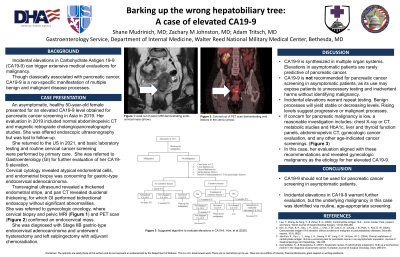Back


Poster Session C - Monday Afternoon
Category: Biliary/Pancreas
C0076 - Barking up the Wrong Hepatobiliary Tree: A Case of Elevated CA19-9
Monday, October 24, 2022
3:00 PM – 5:00 PM ET
Location: Crown Ballroom

Has Audio

Shane Mudrinich, MD
Walter Reed National Military Medical Center
Bethesda, MD
Presenting Author(s)
Shane Mudrinich, MD, Zachary Johnston, MD, Adam Tritsch, MD
Walter Reed National Military Medical Center, Bethesda, MD
Introduction: Incidental elevations in Carbohydrate Antigen 19-9 (CA19-9) can trigger extensive medical evaluations for malignancy. Though classically associated with pancreatic cancer, CA19-9 is a non-specific manifestation of multiple benign and malignant disease processes.
Case Description/Methods: An asymptomatic, healthy 50-year-old female presented to primary care for an elevated CA19-9 level obtained for pancreatic cancer screening in Asia in 2019. Her evaluation in 2019 included abdominopelvic CT and magnetic retrograde cholangiopancreatography, which were normal. She was offered endoscopic ultrasonography to further evaluate pancreaticobiliary etiologies but was lost to follow-up amid the COVID-19 pandemic. She returned to the US in 2021, and basic laboratory testing and routine cervical cancer screening were performed. She was referred to Gastroenterology (GI) for further evaluation. Cervical cytology revealed atypical endometrial cells, and endometrial biopsy by gynecology was concerning for gastric-type endocervical adenocarcinoma. Transvaginal ultrasound revealed a thickened endometrial stripe, and pan CT revealed duodenal thickening, for which GI performed bidirectional endoscopy without significant abnormalities and no pancreatic or metastatic disease. Repeat CA19-9 increased. She was referred to gynecologic oncology, where cervical biopsy and pelvic MRI confirmed an endocervical mass. She was diagnosed with Stage IIB gastric-type endocervical adenocarcinoma and underwent hysterectomy and left salpingectomy with adjuvant chemoradiation.
Discussion: CA19-9 is synthesized in multiple organ systems. Elevations in asymptomatic patients are rarely predictive of pancreatic cancer but may expose patients to unnecessary testing and inadvertent harms without identifying malignancy. Thus, CA19-9 is not recommended for pancreatic cancer screening. Incidental elevations do warrant repeat testing. Benign processes will yield stable or decreasing levels, while rising levels suggest progressive or malignant processes. If concern for pancreatic malignancy is low, a reasonable investigation includes chest X-ray or CT, metabolic studies, hemoglobin A1c, liver and thyroid function panels, abdominopelvic CT or gynecologic cancer evaluation, and any other age-indicated cancer screening. In this case, prior imaging studies suggested low concern for pancreatic cancer. Her subsequent evaluation aligned with this suggested work-up and revealed gynecologic cancer as the ultimate etiology for her elevated CA19-9.
Disclosures:
Shane Mudrinich, MD, Zachary Johnston, MD, Adam Tritsch, MD. C0076 - Barking up the Wrong Hepatobiliary Tree: A Case of Elevated CA19-9, ACG 2022 Annual Scientific Meeting Abstracts. Charlotte, NC: American College of Gastroenterology.
Walter Reed National Military Medical Center, Bethesda, MD
Introduction: Incidental elevations in Carbohydrate Antigen 19-9 (CA19-9) can trigger extensive medical evaluations for malignancy. Though classically associated with pancreatic cancer, CA19-9 is a non-specific manifestation of multiple benign and malignant disease processes.
Case Description/Methods: An asymptomatic, healthy 50-year-old female presented to primary care for an elevated CA19-9 level obtained for pancreatic cancer screening in Asia in 2019. Her evaluation in 2019 included abdominopelvic CT and magnetic retrograde cholangiopancreatography, which were normal. She was offered endoscopic ultrasonography to further evaluate pancreaticobiliary etiologies but was lost to follow-up amid the COVID-19 pandemic. She returned to the US in 2021, and basic laboratory testing and routine cervical cancer screening were performed. She was referred to Gastroenterology (GI) for further evaluation. Cervical cytology revealed atypical endometrial cells, and endometrial biopsy by gynecology was concerning for gastric-type endocervical adenocarcinoma. Transvaginal ultrasound revealed a thickened endometrial stripe, and pan CT revealed duodenal thickening, for which GI performed bidirectional endoscopy without significant abnormalities and no pancreatic or metastatic disease. Repeat CA19-9 increased. She was referred to gynecologic oncology, where cervical biopsy and pelvic MRI confirmed an endocervical mass. She was diagnosed with Stage IIB gastric-type endocervical adenocarcinoma and underwent hysterectomy and left salpingectomy with adjuvant chemoradiation.
Discussion: CA19-9 is synthesized in multiple organ systems. Elevations in asymptomatic patients are rarely predictive of pancreatic cancer but may expose patients to unnecessary testing and inadvertent harms without identifying malignancy. Thus, CA19-9 is not recommended for pancreatic cancer screening. Incidental elevations do warrant repeat testing. Benign processes will yield stable or decreasing levels, while rising levels suggest progressive or malignant processes. If concern for pancreatic malignancy is low, a reasonable investigation includes chest X-ray or CT, metabolic studies, hemoglobin A1c, liver and thyroid function panels, abdominopelvic CT or gynecologic cancer evaluation, and any other age-indicated cancer screening. In this case, prior imaging studies suggested low concern for pancreatic cancer. Her subsequent evaluation aligned with this suggested work-up and revealed gynecologic cancer as the ultimate etiology for her elevated CA19-9.
Disclosures:
Shane Mudrinich indicated no relevant financial relationships.
Zachary Johnston indicated no relevant financial relationships.
Adam Tritsch indicated no relevant financial relationships.
Shane Mudrinich, MD, Zachary Johnston, MD, Adam Tritsch, MD. C0076 - Barking up the Wrong Hepatobiliary Tree: A Case of Elevated CA19-9, ACG 2022 Annual Scientific Meeting Abstracts. Charlotte, NC: American College of Gastroenterology.
